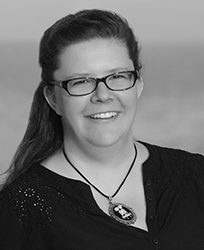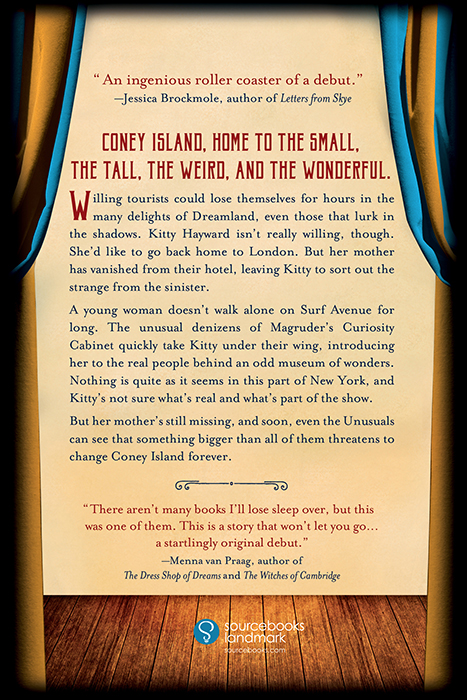Magruder's Curiosity Cabinet (33 page)
Read Magruder's Curiosity Cabinet Online
Authors: H. P. Wood
1.
Magruder's
takes inspiration from plague outbreaks that occurred in San Francisco and Honolulu in the early 1900s. If there were a case of the plague in your neighborhood, how do you think you would react? How about in your local school? Did the plot remind you of more recent events, such as the Ebola outbreak? Or did this seem entirely different? Why?
2. Kitty starts the novel alone on a bench, thinking about drowning herself. She ends as the leader of a fairly big con to save Magruder's. How does she get from point A to point B? What motivates her to change and grow? Does she fail at any point?
3. Some of the characters are “unusual” because of their physical bodies, while others are “unusual” because of their lifestyles. How does the question of choice impact the characters? Does a character like Rosalind have more choice than a character like Zeph? Or not?
4. What attracts certain “normal” characters like Nazan and Spencer to the Magruder's world? And on the other hand, why do you think some characters find the world threatening?
5. Whitey the fireman warns Zeph to stay away from anarchists because of the “trifecta”âmeaning that membership in three minority groups is too many. This idea is sometimes described as “intersectionality,” which refers to being affected by multiple types of oppression (such as racism, sexism, classism, ablism, and homophobia). What other examples of intersectionality do you notice in
Magruder's
? How does intersectionality impact how characters understand the world and one another?
6. Books play a fairly large role in the story:
The Souls of Black Folk
and
The Wizard of Oz
both appear in the first chapter, Nazan and Spencer's first conversation involves Austen and Wells, and a copy of
Captains Courageous
changes Spencer's mind about what his next move should be. Why do you think authors reference other books in their own stories? What do you learn about a particular character based on what book he or she is reading?
7. What role does friendship play in the story? What are some of the key friendships that develop over the course of the book? How and when do characters such as Zeph and Spencer start to see each other as individuals rather than types?
8. At one point, Rosalind tells Seamus the bellhop, “Not one of us knows what we can do, until one fine day, we stand up and do it.” What other instances did you notice where characters “stand up” and do something they didn't intend? How does it work out for them?
9. The story of
Magruder's
is told from a few different points of view. There are certain pointsâfor example, the death of Bernard the Giantâwhere the reader knows more about what's happening than the characters do. Why do you think the author decided to tell the story this way? How do changes in point of view affect the plot, the characters, and the reader? Was one character's point of view more compelling than another?
10. The conclusion of a novel can leave the reader satisfied or disappointed, happy that it's over or wanting more. How did
Magruder's
ending affect you? Why?
Like a starlet on Oscar night, I've no way to know if I'll ever get up on this stage again. So with apologies to the orchestra conductor, I offer the following thanks while I can.
Thanks, Mom, for being my first teacher and greatest supporter.
Thanks to the many other teachers who inspired and shaped (and occasionally terrified) me, including but not limited to Mrs. O'Brien, Mr. Sullivan, Steve Schieffelin, Tori Haring-Smith, Paula Vogel, and also Anne Bogart and Eleanora Von Dehsen, who weren't technically my teachers butâlet's be honestâpretty much were.
Thanks to my father, who said he liked this book when I really needed to hear it.
Thanks to my friends Kate and Charlene and Tom and Ronnie and Jessica and Tim and George, who read lousy drafts I wrote and helped me make them better. (Special thanks to my friend Kat: I guess it's okay if you read this now.)
Thanks to the entire team at Sourcebooks, and most especially my editorsâShana Drehs, Stephanie Bowen, and Grace Menary-Winefield. Their enthusiasm made this possible, and their wisdom challenged me to push harder and do better. Heather Hall and Sabrina Baskey made invaluable contributions as well, saving my hide a number of timesâmy thanks to them too.
Thanks and XXOOs to Courtney Miller-Callahan, for giving me a shot. This would not have happened without her.
Thanks to the entire sprawling Wood familyâthe kindest, most lovely circus I could ever have the great fortune to join.
Thanks to Valerie Tomaselli, my colleague, mentor, and friend, who believed in this project when I didn't.
And thanks most of all to Mark and Maia Rose, who believe in
me
when I don't. Without you, nothing.
All my love,
âH. P.

Credit: Nicole Friedler Photography
H. P. Wood is the granddaughter of a mad inventor and a sideshow magician. Instead of making things disappear, she makes books of all shapes and sizes. She has written or edited works on an array of topics, including the history of the Internet, the future of human rights, and the total awesomeness of playing with sticks. She lives in Connecticut with a charming and patient husband, a daughter from whom she steals all her best ideas, and more cats than is strictly logical.
Thank you for reading
!
At Sourcebooks we are always working on something new and exciting, and we don't want you to miss out.
So sign up now to receive exclusive offers, bonus content, and always be the first to get the scoop on what's new!
